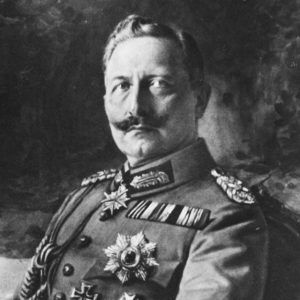
Kaiser Wilhelm, the German emperor, and King of Prussia was a more-than-slightly recognizable figure of World War 1 and World War 2. It was a storied life that included ascending to royalty, abdication, and finally, exile. He also just may have been one of the reasons that World War 1 was started.
Did Kaiser Wilhelm Start World War 1?
Of course the debate of who or what caused the first World War will rage on between historians and historiographers for years to come. But among the most immediate and easily traceable causes was the assassination of Archduke Franz Ferdinand. However, its causes can also be attributed to an outbreak of Imperialism. Before World War I, several European countries planted their proverbial flags, and laid claims in Africa and parts of Asia, making them points of contention. Tensions ran high in Europe as the various countries decide who had the right to exploit these areas for their own benefit. The increasing competition and desire for greater empires led to an increase in confrontation that helped push the world into World War I.
Additionally, many believe that it was militarism that was a catalyst for future events causing World War 1. According to thoughtco.com, As the world entered the 20th century, an arms race had begun, primarily over the number of each country’s warships, and the increasing size of their armies—countries began training more and more of their young men to be prepared for battle. The warships themselves increased in size, number of guns, speed, method of propulsion, and quality armor, beginning in 1906 with Britain’s HMS Dreadnought. Dreadnought was soon out-classed as the Royal Navy and Kaiserliche Marine quickly expanded their ranks with increasingly modern and powerful warships. By 1914, Germany had nearly 100 warships and two million trained soldiers. Great Britain and Germany both greatly increased their navies in this time period. Further, in Germany and Russia particularly, the military establishment began to have a greater influence on public policy. This increase in militarism helped push the countries involved into war.
Further still, many believe that Kaiser Wilhelm II, the commander (if only in name) of Germany was more than a slightly significant factor in the start of the Great War. The young kaiser dreamed of building Germany into a major naval, colonial, and economic power. Determined to have his own way, he forced Chancellor Otto von Bismarck to resign in 1890 and took charge of domestic and foreign policy himself. A series of inept political moves and Kaiser Wilhelm’s fear of being encircled by enemy states strained Germany’s relations with Britain, France, and Russia—moves that helped lead to World War I. In 1896, Wilhelm enraged Britain by sending congratulations to Boer (Dutch South African) leader Paul Kruger following the defeat of a British raid into Boer territory. Not long after, Wilhelm rallied German soldiers to fight in the Chinese Boxer Rebellion (1899-1901), nicknaming the soldiers “Huns” and encouraging them to fight like Attila’s troops.
In fact, according to Military.com, On June 14, two weeks before the assassination of the Archduke Ferdinand, the Austrian Foreign Minister, Count Leopold Berthold, circulated a memorandum in which he called for the destruction of Serbia. That memorandum, along with an accompanying letter by the Austrian Emperor Franz Joseph, was presented to Kaiser Wilhelm on July 5. In his letter, the Austrian emperor declared that the only way of preventing the disintegration of Austria-Hungary was “to eliminate Serbia as a state.” He also stated unequivocally that the decision to invade Serbia had already been made even before the assassination of the Archduke. This was the fourth time since 1912 that the Austrian government had sought Berlin’s support for an invasion of Serbia. Germany had declined on the previous three occasions, citing the fact that the German military was not yet ready for a general war. This time, the Kaiser assured the Austrian government that Berlin would unequivocally back whatever action Vienna took towards Serbia.
According to Brittanica.com, what began as an attempt to save Austria-Hungary from collapse, World War I was transformed into a world conflict by Germany. Wilhelm, having encouraged the Austrians to adopt an uncompromising line, took fright when he found war impending but was not able to halt the implementation of the mobilization measures that he had allowed his generals to prepare. During the war, although nominally supreme commander, Wilhelm did not attempt to resist his generals when they kept its conduct in their own hands. He encouraged, instead of challenging, the grandiose war aims of the generals and of many politicians that ruled out all chances of a compromise peace. By the autumn of 1918, he realized that Germany had lost the war but not that this had made the loss of his throne inevitable.
After finally abdicating his throne, Wilhelm fled to the Netherlands. After the German defeat in World War I, Emperor Wilhelm II sought and got asylum in the neutral Netherlands. On 15 May 1920, he settled in Huis Doorn (House Doorn) near Utrecht, an estate with a lavishly furnished country house, where he would live with his family until his death in 1941.
This article is part of our larger selection of posts about World War One. To learn more, click here for our comprehensive guide to World War One.
Cite This Article
"Did Kaiser Wilhelm Start World War 1?" History on the Net© 2000-2024, Salem Media.
May 1, 2024 <https://www.historyonthenet.com/did-kaiser-wilhelm-start-world-war-1>
More Citation Information.
